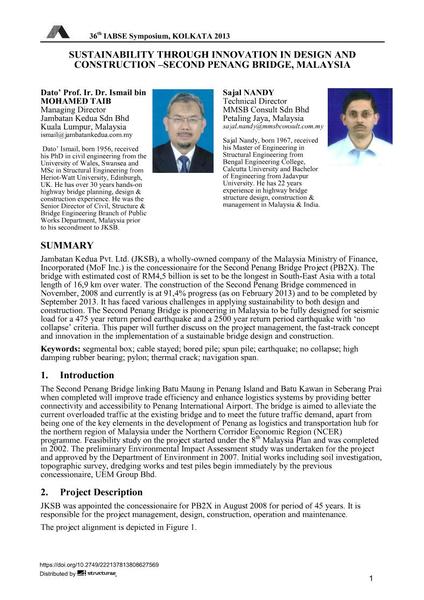Sustainability Through Innovation in Design and Construction – Second Penang Bridge, Malaysia

|
|
|||||||||||
Détails bibliographiques
| Auteur(s): |
Ismail bin Mohamed Taib
Sajal Nandy |
||||
|---|---|---|---|---|---|
| Médium: | papier de conférence | ||||
| Langue(s): | anglais | ||||
| Conférence: | IABSE Symposium: Long Span Bridges and Roofs - Development, Design and Implementation, Kolkata, India, 24-27 September 2013 | ||||
| Publié dans: | IABSE Symposium Kolkata 2013 | ||||
|
|||||
| Page(s): | 1-8 | ||||
| Nombre total de pages (du PDF): | 8 | ||||
| Année: | 2013 | ||||
| DOI: | 10.2749/222137813808627569 | ||||
| Abstrait: |
Jambatan Kedua Pvt. Ltd. (JKSB), a wholly-owned company of the Malaysia Ministry of Finance, Incorporated (MoF Inc.) is the concessionaire for the Second Penang Bridge Project (PB2X). The bridge with estimated cost of RM4,5 billion is set to be the longest in South-East Asia with a total length of 16,9 km over water. The construction of the Second Penang Bridge commenced in November, 2008 and currently is at 91,4% progress (as on February 2013) and to be completed by September 2013. It has faced various challenges in applying sustainability to both design and construction. The Second Penang Bridge is pioneering in Malaysia to be fully designed for seismic load for a 475 year return period earthquake and a 2500 year return period earthquake with ‘no collapse’ criteria. This paper will further discuss on the project management, the fast-track concept and innovation in the implementation of a sustainable bridge design and construction. |
||||
| Mots-clé: |
tremblement de terre pylône
|
||||
